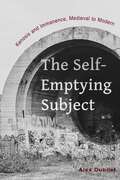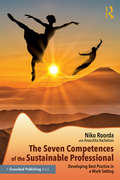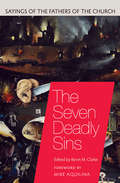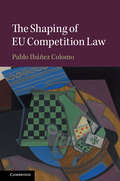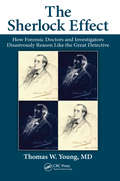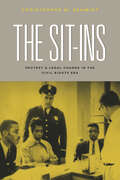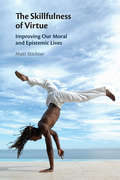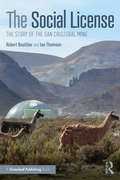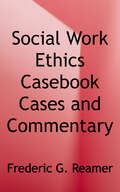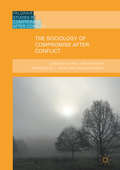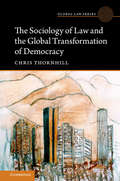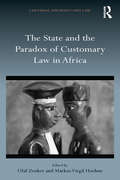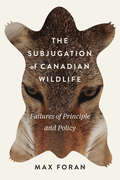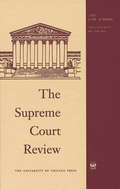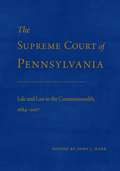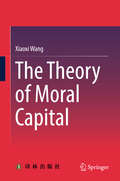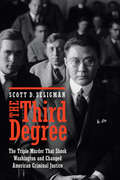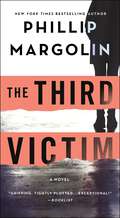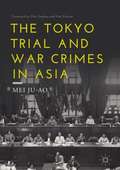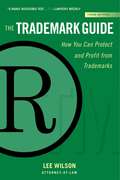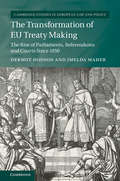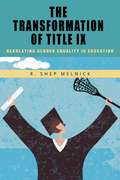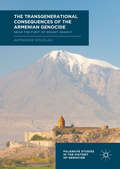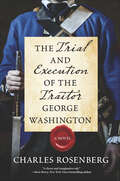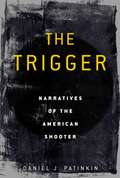- Table View
- List View
The Self-Emptying Subject: Kenosis and Immanence, Medieval to Modern
by Alex DubiletAgainst the two dominant ethical paradigms of continental philosophy–Emmanuel Levinas’s ethics of the Other and Michel Foucault’s ethics of self-cultivation—The Self-Emptying Subject theorizes an ethics of self-emptying, or kenosis, that reveals the immanence of an impersonal and dispossessed life “without a why.” Rather than aligning immanence with the enclosures of the subject, The Self-Emptying Subject engages the history of Christian mystical theology, modern philosophy, and contemporary theories of the subject to rethink immanence as what precedes and exceeds the very difference between the (human) self and the (divine) other, between the subject and transcendence. By arguing that transcendence operates and subjects life in secular no less than in religious domains, this book challenges the dominant distribution of concepts in contemporary theoretical discourse, which insists on associating transcendence exclusively with religion and theology and immanence exclusively with modern secularity and philosophy.The Self-Emptying Subject argues that it is important to resist framing the relationship between medieval theology and modern philosophy as a transition from the affirmation of divine transcendence to the establishment of autonomous subjects. Through an engagement with Meister Eckhart, G.W.F. Hegel, and Georges Bataille, it uncovers a medieval theological discourse that rejects the primacy of pious subjects and the transcendence of God (Eckhart); retrieves a modern philosophical discourse that critiques the creation of self-standing subjects through a speculative re-writing of the concepts of Christian theology (Hegel); and explores a discursive site that demonstrates the subjecting effects of transcendence across theological and philosophical operations and archives (Bataille). Taken together, these interpretations suggest that if we suspend the antagonistic relationship between theological and philosophical discourses, and decenter our periodizing assumptions and practices, we might encounter a yet unmapped theoretical fecundity of self-emptying that frees life from transcendent powers that incessantly subject it for their own ends.
The Seven Competences of the Sustainable Professional: Developing Best Practice in a Work Setting
by Niko Roorda Anouchka RachelsonThe Seven Competences of the Sustainable Professional shows how every professional can contribute to sustainable development. Through real-life stories told by a range of professionals, each illustrating a sustainability competence, this book provides a practical guide to help professionals realize their sustainability potential. Together, these competences form an accessible framework that is explained in practical terms. Readers are able to check their own sustainability competence level and make plans for personal development at each stage of the book. There are dozens of books explaining how companies and organizations should work decently, dealing with topics like corporate social responsibility (CSR), sustainable entrepreneurship, and corporate governance. There is an equally large number of books that describe how individuals should behave in their private lives, for instance, by buying healthy food, using energy-saving equipment, showering with less water, and switching off lights in empty rooms. However, this is the first book to provide individual professionals with a clear framework to enable them to act in a sustainable way in their workplace, be they the CEO, CFO, manager, or office worker.
The Seven Deadly Sins: Sayings of the Fathers of the Church (Sayings Of The Fathers Of The Church Ser.)
by Kevin M. Clarke&“Read this not just for intellectual enjoyment but to discover a centuries-old, proven path for conquering your worst sins&” (Brandon Vogt, author of Why I Am Catholic). Gluttony. Lust. Greed. Anger. Sloth. Envy. Pride. The capital vices are the gateway drugs to countless sins. But where did this tradition come from? Unsurprisingly, it can be traced back to the teachings of the Church Fathers, whose words—included in this book—answer such questions as: So how do the capital sins spawn other vices in the soul? How does one cultivate the virtues that heal the soul from those vices? How are gluttony and lust related? What role does almsgiving have in soothing the passion of anger? As the path of the book descends through the vices, the words of the Fathers will assist readers in being more realistic about the attacks upon the soul. Edifying and medicinal, each chapter begins with vice and ends with virtue, so one&’s path through the chapters represents a sort of ascent out of sin and on to the road to righteousness. The text gives special attention to the thoughts of Augustine of Hippo, Evagrius of Pontus, John Cassian, Gregory the Great, and Maximus the Confessor. &“An illuminating survey of the Church Fathers&’ wisdom on the capital vices that have burdened us since time immemorial.&” —Curtis A. Martin, Founder and CEO of FOCUS &“A wonderfully helpful compendium of insights and advice from the Church Fathers . . . You will be astonished at how relevant and applicable is this ancient wisdom to the life of the modern-day Christian. Highly recommended.&” —James Martin, SJ, author of Jesus: A Pilgrimage
The Shaping of EU Competition Law
by Pablo Ibáñez ColomoBased on a unique and comprehensive database, The Shaping of EU Competition Law combines qualitative and quantitative approaches to shed light on the evolution of EU competition law. It brings a new perspective to some of the most topical issues in the field including due process and the intensity of judicial review. The author's main purpose is to examine how the institutional structure influences the substance of EU competition law provisions. He seeks to identify patterns in the behaviour of the European Commission and the EU Courts and how they interact with each other. In particular, his analysis considers how the European Commission reacts to the case law and whether, and in what instances, the EU courts defer to the analysis of the administrative authority. The analysis is supported by the database and an unprecedented array of statistics and figures free to view online.
The Sherlock Effect: How Forensic Doctors and Investigators Disastrously Reason Like the Great Detective
by Thomas W. YoungForensic science is in crisis and at a cross-roads. Movies and television dramas depict forensic heroes with high-tech tools and dazzling intellects who—inside an hour, notwithstanding commercials—piece together past-event puzzles from crime scenes and autopsies. Likewise, Sherlock Holmes—the iconic fictional detective, and the invention of forensic doctor Sir Arthur Conan Doyle—is held up as a paragon of forensic and scientific inspiration—does not "reason forward" as most people do, but "reasons backwards." Put more plainly, rather than learning the train of events and seeing whether the resultant clues match those events, Holmes determines what happened in the past by looking at the clues. Impressive and infallible as this technique appears to be—it must be recognized that infallibility lies only in works of fiction. Reasoning backward does not work in real life: reality is far less tidy. In courtrooms everywhere, innocent people pay the price of life imitating art, of science following detective fiction. In particular, this book looks at the long and disastrous shadow cast by that icon of deductive reasoning, Sherlock Holmes. In The Sherlock Effect, author Dr. Thomas W. Young shows why this Sherlock-Holmes-style reasoning does not work and, furthermore, how it can—and has led—to wrongful convictions. Dr. Alan Moritz, one of the early pioneers of forensic pathology in the United States, warned his colleagues in the 1950’s about making the Sherlock Holmes error. Little did Moritz realize how widespread the problem would eventually become, involving physicians in all other specialties of medicine and not just forensic pathologists. Dr. Young traces back how this situation evolved, looking back over the history of forensic medicine, revealing the chilling degree to which forensic experts fail us every day. While Dr. Young did not want to be the one to write this book, he has felt compelled in the interest of science and truth. This book is measured, well-reasoned, accessible, insightful, and—above all—compelling. As such, it is a must-read treatise for forensic doctors, forensic practitioners and students, judges, lawyers adjudicating cases in court, and anyone with an interest in forensic science.
The Sit-Ins: Protest and Legal Change in the Civil Rights Era (Chicago Series in Law and Society)
by Christopher W. SchmidtOn February 1, 1960, four African American college students entered the Woolworth department store in Greensboro, North Carolina, and sat down at the lunch counter. This lunch counter, like most in the American South, refused to serve black customers. The four students remained in their seats until the store closed. In the following days, they returned, joined by growing numbers of fellow students. These “sit-in” demonstrations soon spread to other southern cities, drawing in thousands of students and coalescing into a protest movement that would transform the struggle for racial equality. The Sit-Ins tells the story of the student lunch counter protests and the national debate they sparked over the meaning of the constitutional right of all Americans to equal protection of the law. Christopher W. Schmidt describes how behind the now-iconic scenes of African American college students sitting in quiet defiance at “whites only” lunch counters lies a series of underappreciated legal dilemmas—about the meaning of the Constitution, the capacity of legal institutions to remedy different forms of injustice, and the relationship between legal reform and social change. The students’ actions initiated a national conversation over whether the Constitution’s equal protection clause extended to the activities of private businesses that served the general public. The courts, the traditional focal point for accounts of constitutional disputes, played an important but ultimately secondary role in this story. The great victory of the sit-in movement came not in the Supreme Court, but in Congress, with the passage of the Civil Rights Act of 1964, landmark legislation that recognized the right African American students had claimed for themselves four years earlier. The Sit-Ins invites a broader understanding of how Americans contest and construct the meaning of their Constitution.
The Skillfulness of Virtue: Improving our Moral and Epistemic Lives
by Matt StichterThe Skillfulness of Virtue provides a new framework for understanding virtue as a skill, based on psychological research on self-regulation and expertise. Matt Stichter lays the foundations of his argument by bringing together theories of self-regulation and skill acquisition, which he then uses as grounds to discuss virtue development as a process of skill acquisition. This account of virtue as skill has important implications for debates about virtue in both virtue ethics and virtue epistemology. Furthermore, it engages seriously with criticisms of virtue theory that arise in moral psychology, as psychological experiments reveal that there are many obstacles to acting and thinking well, even for those with the best of intentions. Stichter draws on self-regulation strategies and examples of deliberate practice in skill acquisition to show how we can overcome some of these obstacles, and become more skillful in our moral and epistemic virtues.
The Social License: The Story of the San Cristobal Mine
by Ian Thomson Robert BoutilierThis unique book combines a colourful history of Bolivian politics with some of the most advanced quantitative techniques yet developed for socio-political risk analysis. This is the story of how a foreign-owned private sector mining company (Minera San Cristobal - MSC) earned, lost, and regained its social licence to operate. Robert G. Boutilier and Ian Thomson, leading experts in stakeholder management theory and practice, transform the concept of the SLO from a metaphor to a management tool. The book traces the development of new concepts and measures in the field of stakeholder engagement while following the narrative of a community struggling with a fundamental change in its identity from a declining, malnourished llama-herding village to one of the richest towns in Bolivia. This remarkable story will inspire practitioners in the field of stakeholder management; it will provide an invaluable roadmap for professionals working on land re-use projects in the energy, mining, and conservation sectors; it will make stakeholder relations concepts and techniques accessible to students through an engaging and in-depth case study; and it will open your eyes to one of the most fascinating accounts of how two different cultures collided and then came together to address different but aligned goals.
The Social Work Ethics Casebook: Cases and Commentary
by Frederic G. ReamerThis is the first ethics casebook, including extensive cases and commentary, published exclusively for social workers. The book's realistic ethics cases provide a useful tool for rich discussion of ethical dilemmas and ethical decision making. Following each set of cases, Reamer includes commentary highlighting key ethics concepts and references to relevant standards in the NASW Code of Ethics. <p><p>The release of Social Work Ethics Casebook highlights ethical issues related to confidentiality and privacy, informed consent, client self-determination, professional paternalism, boundary issues and dual relationships, conflicts of interest, cultural and ethnic diversity, termination of services, administration, collegial impairment, commitments to employers, social work education and training, and more. Each section of the book also includes discussion questions designed to enhance readers understanding and application of important ethics concepts.
The Sociology of Compromise after Conflict (Palgrave Studies in Compromise after Conflict)
by John D. BrewerThis book introduces a new and original sociological conceptualization of compromise after conflict and is based on six-years of study amongst victims of conflict in Northern Ireland, South Africa and Sri Lanka, with case studies from Sierra Leone and Colombia. A sociological approach to compromise is contrasted with approaches in Moral and Political Philosophy and is evaluated for its theoretical utility and empirical robustness with in-depth interview data from victims of conflicts around the globe. The individual chapters are written to illustrate, evaluate and test the conceptualization using the victim data, and an afterword reflects on the new empirical agenda in victim research opened up by a sociological approach to compromise. This volume is part of a larger series of works from a programme advancing a sociological approach to peace processes with a view to seeing how orthodox approaches within International Relations and Political Science are illuminated by the application of the sociological imagination.
The Sociology of Law and the Global Transformation of Democracy (Global Law Series)
by Chris ThornhillThis book provides a new legal-sociological account of contemporary democracy. It is based on a revision of standard positions in democratic theory, reflecting the impact of global legal norms on the institutions of national states. Chris Thornhill argues that the establishment of fully democratic, fully inclusive governance systems in national societies was generally impeded by inner-societal structural factors, and that inclusive patterns of democratic citizenship only evolved on the foundation of global legal norms that were consolidated after 1945. He claims that this process can be best understood through a transposition of key insights of classical legal sociology onto the form of global society. Extensive analysis of select case studies in different regions illustrate these claims. Thornhill offers a sociological theory of global law to explain contemporary processes of democratic integration and institutional formation, and contemporary constructions of citizenship and political rights. This title is also available as Open Access.
The State and the Paradox of Customary Law in Africa (Cultural Diversity and Law)
by Olaf Zenker Markus Virgil HoehneCustomary law and traditional authorities continue to play highly complex and contested roles in contemporary African states. Reversing the common preoccupation with studying the impact of the post/colonial state on customary regimes, this volume analyses how the interactions between state and non-state normative orders have shaped the everyday practices of the state. It argues that, in their daily work, local officials are confronted with a paradox of customary law: operating under politico-legal pluralism and limited state capacity, bureaucrats must often, paradoxically, deal with custom – even though the form and logic of customary rule is not easily compatible and frequently incommensurable with the form and logic of the state – in order to do their work as a state. Given the self-contradictory nature of this endeavour, officials end up processing, rather than solving, this paradox in multiple, inconsistent and piecemeal ways. Assembling inventive case studies on state-driven land reforms in South Africa and Tanzania, the police in Mozambique, witchcraft in southern Sudan, constitutional reform in South Sudan, Guinea’s long durée of changing state engagements with custom, and hybrid political orders in Somaliland, this volume offers important insights into the divergent strategies used by African officials in handling this paradox of customary law and, somehow, getting their work done.
The Subjugation of Canadian Wildlife: Failures of Principle and Policy (McGill-Queen's Rural, Wildland, and Resource Studies #9)
by Max ForanHardly a day goes by without news of the extinction or endangerment of yet another animal species, followed by urgent but largely unheeded calls for action. An eloquent denunciation of the failures of Canada’s government and society to protect wildlife from human exploitation, Max Foran’s The Subjugation of Canadian Wildlife argues that a root cause of wildlife depletions and habitat loss is the culturally ingrained beliefs that underpin management practices and policies. <P><P>Tracing the evolution of the highly contestable assumptions that define the human–wildlife relationship, Foran stresses the price wild animals pay for human self-interest. Using several examples of government oversight at the federal, provincial, and territorial levels, from the Species at Risk Act to the Biodiversity Strategy, Protected Areas Network, and provincial management plans, this volume shows that wildlife policies are as much – or more – about human needs, priorities, and profit as they are about preservation. Challenging established concepts including ecological integrity, adaptive management, sport hunting as conservation, and the flawed belief that wildlife is a renewable resource, the author compels us to recognize animals as sentient individuals and as integral components of complex ecological systems. <P><P>A passionate critique of contemporary wildlife policy, The Subjugation of Canadian Wildlife calls for belief-change as the best hope for an ecologically healthy, wildlife-rich Canada.
The Supreme Court Review, 2017 (Supreme Court Review)
by The University of Chicago PressSince it first appeared in 1960, The Supreme Court Review (SCR) has won acclaim for providing a sustained and authoritative survey of the implications of the Court's most significant decisions. SCR is an in-depth annual critique of the Supreme Court and its work, keeping up on the forefront of the origins, reforms, and interpretations of American law. SCR is written by and for legal academics, judges, political scientists, journalists, historians, economists, policy planners, and sociologists.
The Supreme Court of Pennsylvania: Life and Law in the Commonwealth, 1684–2017 (G - Reference, Information and Interdisciplinary Subjects)
by John J. HareEstablished in 1684, over a century before the Commonwealth, Pennsylvania’s Supreme Court is the oldest appellate court in North America. This balanced, comprehensive history of the Court examines over three centuries of legal proceedings and cases before the body, the controversies and conflicts with which it dealt, and the impact of its decisions and of the case law its justices createdIntroduced by constitutional scholar Ken Gormley, this volume describes the Supreme Court’s structure and powers and focuses at length on the Court’s work in deciding notable cases of constitutional law, civil rights, torts, criminal law, labor law, and administrative law. Through three sections, “The Structure and Powers of the Supreme Court,” “Decisional Law of the Supreme Court,” and “Reporting Supreme Court Decisions,” the contributors address the many ways in which the Court and its justices have shaped life and law in Pennsylvania and beyond. They consider how it has adjudicated new and complex issues arising from some of the most notable events and tragedies in American history, including the struggle for religious liberty in colonial Pennsylvania, the Revolutionary War, slavery, the Johnstown Flood, the Homestead Steel Strike and other labor conflicts, both World Wars, and, more recently, the dramatic rise of criminal procedural rights and the expansion of tort law. Featuring an afterword by Chief Justice Saylor and essays by leading jurists, deans, law and history professors, and practicing attorneys, this fair-minded assessment of the Court is destined to become a criterion volume for lawmakers, scholars, and anyone interested in legal history in the Keystone State and the United States.
The Theory of Moral Capital
by Xiaoxi WangThis book captures the quintessence of the author’s 20-year career, presenting both unique perspectives and logical arguments. Guided by the Marxist concept of historical materialism, it reveals the function and effect of morality by analyzing and defining the moral domain. Further, it argues that economic development requires moral support by analyzing the inseparable logical connection between economics and morality. Moreover, it investigates moral capital and its route to achieving value multiplication in economic activities, and proposes a practice and evaluation index system for moral capital in enterprises. Combining philosophical analysis and the exploration of practical applications, the book also discusses a basic strategy to help enterprises enrich and manage their moral capital.
The Third Degree: The Triple Murder That Shook Washington and Changed American Criminal Justice
by Scott D. SeligmanIf you’ve ever seen an episode of Law and Order, you can probably recite your Miranda rights by heart. But you likely don’t know that these rights had their roots in the case of a young Chinese man accused of murdering three diplomats in Washington DC in 1919. A frantic search for clues and dogged interrogations by gumshoes erupted in sensational news and editorial coverage and intensified international pressure on the police to crack the case. Part murder mystery, part courtroom drama, and part landmark legal case, The Third Degree is the true story of a young man’s abuse by the Washington police and an arduous, seven-year journey through the legal system that drew in Warren G. Harding, William Howard Taft, Oliver Wendell Holmes, John W. Davis, and J. Edgar Hoover. The ordeal culminated in a sweeping Supreme Court ruling penned by Justice Louis Brandeis that set the stage for the Miranda warning many years later. Scott D. Seligman argues that the importance of the case hinges not on the defendant’s guilt or innocence but on the imperative that a system that presumes one is innocent until proven guilty provides protections against coerced confessions. Today, when the treatment of suspects between arrest and trial remains controversial, when bias against immigrants and minorities in law enforcement continues to deny them their rights, and when protecting individuals from compulsory self-incrimination is still an uphill battle, this century-old legal spellbinder is a cautionary tale that reminds us how we got where we are today and makes us wonder how far we have yet to go.
The Third Victim: A Novel (Third Victim Ser. #1)
by Phillip Margolin"Margolin continues his return to the exceptional form of his early novels with this gripping, tightly plotted, and smoothly written legal thriller... A winner from a veteran genre author." —BooklistThe “master of heart-pounding suspense” returns with a brand new series and a USA Today bestseller?The Third Victim is New York Times bestseller Phillip Margolin at his very best.A woman stumbles onto a dark road in rural Oregon—tortured, battered, and bound. She tells a horrific story about being kidnapped, then tortured, until she finally managed to escape. She was the lucky one—two other women, with similar burns and bruises, were found dead. The surviving victim identifies the house where she was held captive and the owner, Alex Mason—a prominent local attorney—is arrested. Although he loudly insists upon his innocence, his wife’s statements about his sexual sadism and the physical evidence found at the scene, his summer home, is damning. Regina Barrister is a legendary criminal defense attorney, known as “The Sorceress” for her courtroom victories. But she’s got a secret, one that threatens her skill, her reputation, and, most of all, her clients. And she’s agreed to take on the seemingly impossible task of defending Alex Mason. Robin Lockwood, a young lawyer and former MMA fighter, has just left a clerkship at the Oregon Supreme Court to work for Regina Barrister. The Alex Mason trial is her first big one, a likely death penalty case, and she’s second chair to Regina. Increasingly, she’s worried her boss’s behavior and the details in the case against their client don’t quite add up.
The Tokyo Trial and War Crimes in Asia
by Mei Ju-AoThis book examines the process and the impact of the International Military Tribunal for the Far East, otherwise known as the Tokyo Trial, which was convened in 1946 to try political military leaders accused of involvement in war crimes. Offering valuable research material on the establishment of the tribunal, it studies the background to the establishment of the International Military Tribunal and the lessons learned from earlier trials of World War One War Criminals. It addresses the IMTFE charter and records the establishment and development of the Tokyo Trial war crime principles, the confirmation of the Class A War Criminal list and the subsequent arrests and interrogations. It revisits the organization of the judges, the responsibilities of the prosecution and defense teams as well as the US representation in the defence. Offering the perspective of a Chinese prosecutor who was both jurist and witness, this unique text engages with the Tokyo Trial from an interdisciplinary perspective, bringing in both international law and international relations, and over seven decades later measures the significance and ongoing legacy of the Tokyo Trial for contemporary international criminal justice in Asia and beyond.
The Trademark Guide: How You Can Protect and Profit from Trademarks (Third Edition) (Allworth Intellectual Property Made Easy)
by Lee Wilson"A highly accessible text." —Lawyers Weekly A User-Friendly Handbook on Understanding Trademarks Trademarks are a crucial part of the American economy. In plain language with scores of real-life examples, this new edition of The Trademark Guide draws on Wilson's experience and addresses issues important to both would-be trademark owners and those who already own trademarks, including: How to choose a trademark without risking a lawsuit How trademark rights are gained and perfected How to use a trademark properly What constitutes trademark infringement What to do if your trademark is infringed How trademark law applies to new media And much more Completely updated to reflect recent court decisions and changes in the law, this edition features an Internet trademark resources list and expanded information on trademarks in the digital world. Packed with examples, FAQs, and a glossary, The Trademark Guide, Third Edition, will become the go-to for anyone with questions about the complexities of trademark law.
The Transformation of EU Treaty Making: The Rise of Parliaments, Referendums and Courts since 1950 (Cambridge Studies in European Law and Policy)
by Imelda Maher Dermot HodsonTreaty making is a site of struggle between those who claim the authority to speak and act on the international stage. The European Union (EU) is an important test case in this respect because the manner in which the Union and its member states make treaties has shifted significantly over the last six decades. Drawing insights from EU law, comparative constitutionalism and international relations, this book shows how and why parliaments, the people and courts have entered a domain once dominated by governments. It presents qualitative and quantitative evidence on the importance of public trust and political tactics in explaining this transformation of EU treaty making and challenges the idea that EU treaties are too rigid. Analysing legal developments in the EU and each of its member states, this will be essential reading for those who wish to understand the EU's controversial experiment in treaty making and its wider significance.
The Transformation of Title IX: Regulating Gender Equality in Education
by R. Shep MelnickIn this book, the author analyzes how interpretations of "equal educational opportunity" have changed over the years. In terms accessible to non-lawyers, the author examines how Title IX has become a central part of legal and political campaigns to correct gender stereotypes, not only in academic settings but in society at large. Title IX thus has become a major factor in America's culture wars―and almost certainly will remain so for years to come.
The Transgenerational Consequences of the Armenian Genocide: Near The Foot Of Mount Ararat (Palgrave Studies in the History of Genocide)
by Anthonie HolslagThis book brings together the Armenian Genocide process and its transgenerational outcome, which are often juxtaposed in existing scholarship, to ask how the Armenian Genocide is conceptualized and placed within diasporic communities. Taking a dual approach to answer this question, Anthonie Holslag studies the cultural expression of violence during the genocidal process itself, and in the aftermath for the victims. By using this approach, this book allows us to see comparatively how genocide in diasporic communities in the Netherlands, London and the US is encapsulated in an historic narrative. It paints a picture of the complexity of genocidal violence itself, but also in its transgenerational and non-spatial consequences, raising new questions of how violence can be perpetuated or interlocked with the discourse and narratives of the victims, and how the violence can be relived.
The Trial and Execution of the Traitor George Washington: A Novel
by Charles RosenbergA Finalist for the Sidewise Award for Alternate History“A clever and imaginative tale.” —Steve Berry, New York Times bestselling authorA thought-provoking novel that imagines what would have happened if the British had succeeded in kidnapping General George Washington.British special agent Jeremiah Black, an officer of the King’s Guard, lands on a lonely beach in the wee hours of the morning in late November 1780. The revolution is in full swing but has become deadlocked. Black is here to change all that.His mission, aided by Loyalists, is to kidnap George Washington and spirit him back to London aboard the HMS Peregrine, a British sloop of war that is waiting closely offshore. Once he lands, though, the “aid by Loyalists” proves problematic because some would prefer just to kill the general outright. Black manages—just—to get Washington aboard the Peregrine, which sails away.Upon their arrival in London, Washington is imprisoned in the Tower to await trial on charges of high treason. England’s most famous barristers seek to represent him but he insists on using an American. He chooses Abraham Hobhouse, an American-born barrister with an English wife—a man who doesn’t really need the work and thinks the “career-building” case will be easily resolved through a settlement of the revolution and Washington’s release. But as greater political and military forces swirl around them and peace seems ever more distant, Hobhouse finds that he is the only thing keeping Washington from the hangman’s noose.Drawing inspiration from a rumored kidnapping plot hatched in 1776 by a member of Washington’s own Commander-in-Chief Guard, Charles Rosenberg has written a compelling novel that envisions what would take place if the leader of America’s fledgling rebellion were taken from the nation at the height of the war, imperiling any chance of victory.
The Trigger: Narratives of the American Shooter
by Daniel J. PatinkinSix moving profiles reveal the complex realities behind gun violence in the United States. These are the stories of the shooters.In South Carolina, a young man embarks on a life of crime that culminates in a drug-related shooting and decades in prison; in Chicago, an off-duty police officer engages in a shootout with a murderous gunman, saving a fellow patrolman; in rural Tennessee, a troubled teenager shoots her abusive father in his sleep. The Trigger recounts the dramatic life stories of six individuals who have shot someone in America.In 2017, over 15,000 were killed and over 31,000 were injured by gunfire. Faced with these desensitizing statistics, one easily forgets that each incident is perpetrated by a living, feeling human being who has walked a unique path. The causes and consequences of these violent acts are often far more complicated than one might expect.Author Daniel J. Patinkin exhaustively interviewed each of six shooters about their life experiences and about the unique circumstances that compelled them to use a firearm against another person. The result is a series of profound narratives that is sure to distress and challenge the reader, but also, perhaps, to provide enlightenment and inspiration.
